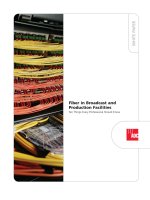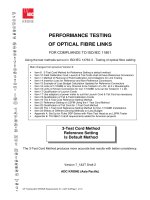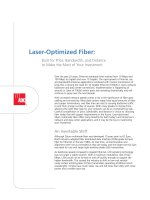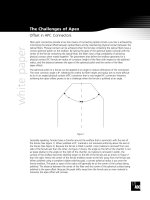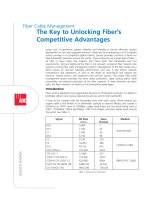Tài liệu ADC KRONE - Guide - Mitigation Techniques To Reduce Alien Crosstalk Noise In 10GBE Channels ppt
Bạn đang xem bản rút gọn của tài liệu. Xem và tải ngay bản đầy đủ của tài liệu tại đây (29.94 KB, 2 trang )
10GBE Alien CrossTalk Mitigation 060625
Mitigation Techniques To Reduce Alien Crosstalk Noise In 10GBE Channels
Using UTP Cabling
These mitigation techniques are good installation practices that will benefit both
Class E and Class E
A
performance.
Always use the Random Lay mantra;
“Random lay in the bundle and tray
For Cat 6 cable and Cat 6
A
“
©
P. Meijer
An existing Class E channel using Category 6 components will have its performance
improved to a level where it may comfortably carry 10GBE applications by applying
where possible a combination of some of the following;
At the Floor Distributor
Remove cable ties from bundles in the telecommunication room racks, cabinets and
pathways. The majority of ANEXT occurs in the first 15 meters from the patch panel
or termination modules where the signal strength is greatest.
Apply cable bundle fasteners only where necessary to mechanically support the
cables and at both sides of a change in vertical direction of the cabling.
Use only ‘hook & loop’ type fasteners, at least 12 mm wide, or approved elastic
bundle fasteners. Do not use nylon ties or ‘zip ties’.
Upgrade patch cords to CopperTen Cat 6
A
patch cords. Use longer patch cords to
provide more ANEXT noise attenuation, but do not exceed the allowable Channel
Insertion Loss. The minimum patch cord length must be 2.1 metres. 3 metre
CopperTen patch cords give even better ANEXT mitigation.
Place the patch cords in Random Lay so that there is less chance of coupling from
parallel runs.
Replace existing Category 6 patch panels with polymer Category 6
A
staggered-socket
patch panels. This increases the separation between outlets and minimises coupling.
Where patch panel replacement is not possible, use non-adjacent sockets and non-
adjacent channels for the 10GBE.
Use patch cord management systems like the ADC Glide Managers that allow room
and facility for Random Lay and/or patch cord separation.
Change from a cross-connect to an interconnect cabling arrangement. The unused
cross-connect panels or modules are re-usable for other circuits or other locations.
10GBE Alien CrossTalk Mitigation 060625
In the Horizontal Cable runs
Where metallic or mesh trays are used, the cables should be physically separated
and placed in Random Lay to minimise alien crosstalk. Earth all metal and mesh
trays with at least 2.5 mm
2
Gn/Yl earth wire connected to protective earth. Do not
fasten cables into bundles. Do not fasten any cables onto the tray/mesh except for
change of vertical direction >45° or to maintain a fixes separation from a hazardous
service.
At the consolidation point, replace the Category 6 modules with CopperTen Modules
and ensure the cables are in a Random Lay configuration.
Reduce the length of the long Permanent Links and Channels. But be aware of
possible AFEXT issues. Short run lengths produce high frequency AFEXT noise
(unless power back-off is applied in transmitters). So, separate the short runs from
the long runs, if possible. Apply the Random Lay principle.
If AACR-F noise is a problem the only remedy is to separate the channels over the
entire length. Separating only at the beginning of the channel improves the ANEXT,
but it does not improve AACR-F.
Replace the existing Category 6 cabling with CopperTen cabling.
At the TO
When the connectors are grouped at the TO, use 2 dual socket faceplates instead of
a single triple socket faceplate. If this is not possible, use different protocols like
only one 10GBE and two Category 6 outlets in a triple socket faceplate.
In MUTO assemblies, ensure there is at least 20 mm separation all round between
socket mounting holes (that the socket clips into).
General
Consider doing several mitigation techniques together (e.g. removing fasteners,
unbundling and applying Random Lay, plus changing patch cords and equipment
cords, plus changing to a polymer staggered-socket patch panel).
If ANEXT margin up to 500 MHz is worse than - 6 dB, then mitigation may not be
sufficient. Either replace the cabling system with CopperTen or limit the use of
10GBE to short channels with low Insertion Loss and low ANEXT.
Once the channels have been qualified for ANEXT, each channel needs to be further
qualified for internal transmission parameters up to 500 MHz. If any channel fails
these internal transmission parameters, the mitigation steps above need to be
repeated.



